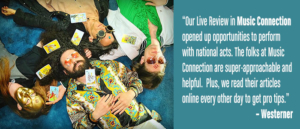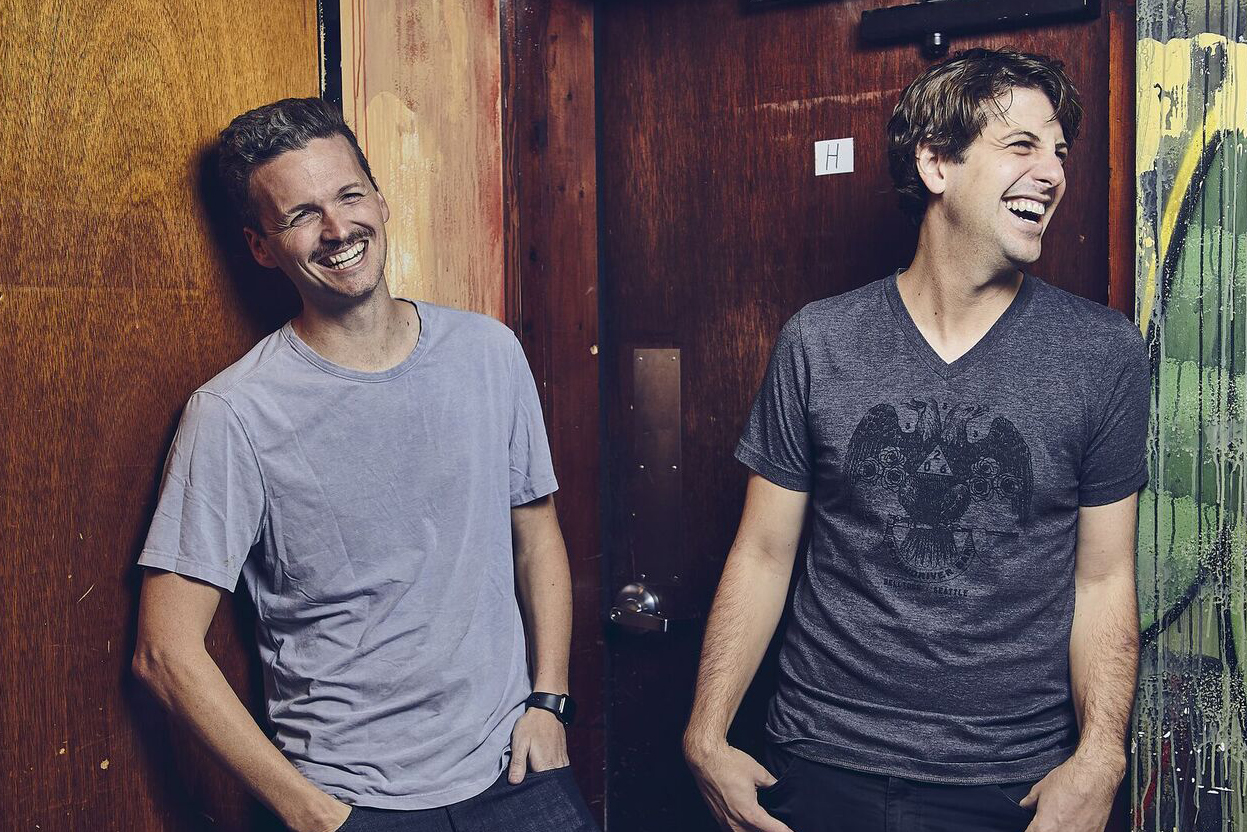Creative people often color outside the lines. The Flaming Lips’ singer Wayne Coyne doesn’t even know the lines exist. In fact, Coyne and his gang of artful misfits have been defying expectations in ways equally confusing and enchanting since 1983.
Consider some of the eccentric milestones they’ve accumulated over their storied career. In 1997, they released an experimental 4-CD project wherein listeners were instructed to play each disc simultaneously. An evolution of this exercise saw Coyne “conducting” up to 40 fans controlling the volume of specially recorded cassettes.” The year 2009 saw them covering the entirety of Pink Floyd’s The Dark Side of the Moon and in 2011 they dropped “7 Skies H3,” a song that endures a full 24 hours. The band has worked alongside a smattering of unconventional collaborators, everyone from pop icon Miley Cyrus to rock duo Deap Vally and punk hero Henry Rollins. Continuing this trend, their forthcoming release boasts vocals from country singer Kacey Musgraves. Most cryptically, they once hawked music encased in skulls made from gummy candy. And this is only part of the group’s baffling pedigree.
On Sept. 11, the Lips will release American Head, their 21st studio album. Trumpeted as a stylistic return to form, those yearning for the sound presented on two of their most popular albums, The Soft Bulletin and Yoshimi Battles the Pink Robots, will revel in the collection’s 13 soothingly psychedelic tracks. To date, they have unleashed three music videos in support of the project, each featuring the sort of striking visuals for which they’re renown. Their filmic take for “Dinosaurs On The Mountain,” for instance, presents the players performing while quarantined in individual plastic bubbles. Inspired by the rise of this absurd concept alongside our world-halting COVID-19 pandemic, Coyne scribbled a humorous illustration depicting him on stage before an audience filled with similarly bubbled fans. Smartly, Coyne made the image available for purchase in T-shirt form, flipping the virus’ ever-present negativity into an artful and profitable opportunity. It is representative of the whimsical, surrealistic and unconventional positivity that keeps Flaming Lips fans returning for more.
But what makes Coyne so fascinating is his uncalculated perspective on music and life. A pure artist, he’s refreshingly real, placing emphasis on creativity over anything else. MC chatted up Coyne regarding his nearly four-decade career and how his rollicking approach to everything Flaming Lips has worked in his favor, allowing the chaos behind a career in sound to inspire, guide and ultimately assist his never-ending quest to conquer imaginative ground.
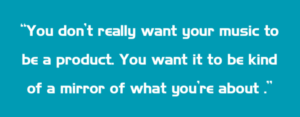
Music Connection: Congratulations on your new album.
Wayne Coyne: Thank you. Sometimes you feel like it’s not that important, but music is always a great thing.
MC: American Head is your 21st album. Is this release as exciting as your first?
Coyne: Probably more exciting. I could see where people get jaded or burned out, but we love making music and making records. We would probably make them if no one even wanted them.
MC: How do you keep the process fresh?
Coyne: We don’t ever think of it like that. I can see where, for some people, that would be [a] relevant [question], but for us it’s not. We really enjoy it. The more you do it, the more confident you get, the more you brush off mistakes or things that don’t go right. You see how much of it is just luck, so when things go good you don’t feel that responsible for it and you’re thankful. And when it goes badly you don’t feel like you’re a failure. I don’t think it ever gets old.
MC: Was the process of writing songs for this album different from your other albums?
Coyne: No, not really. We have a slightly different agenda sometimes, depending on the vibe or mood of the record we think we’re creating. And we’ve become a bit more keen on honing in on emotional, melodic things. Music has such a great crescendo of emotion. You can be feeling normal and happy and then you put on a song and within 45-seconds you’re crying and back in time to some moment in your life. It’s a powerful rush. I think we’ve gotten more where we want that to happen, that emotional connection.
But a lot of it is just feeling in the dark. You don’t really know what you’re doing. It’s such an abstract, strange thing. It’s a bit like being a blind painter. You paint a picture and everybody says, man, that picture was great. And you’re kind of like, I don’t know what I did to make it so great, but I’m glad it works.
MC: “You don’t know where you’re going until you get there.”
Coyne: Well, even then, because we enjoy doing it… I say we work hard. A lot of people work hard at what they do. Sometimes we work at it too much and ruin what was a good thing. But you want it to be left with your personality all over it. You can’t tone it down too much. You don’t really want it to be a product. You want it to be kind of a mirror of what you’re about.
MC: With the pandemic shutting down concerts, do you still want to perform? Have you thought about doing livestreams?
Coyne: I don’t really like livestreams. I’m glad people are doing something, but I’m not that interested in that thing. Seeing people in their houses is not a substitute for being in a room that’s alive and full of energy. What I’ve liked about the ones I have watched wasn’t necessarily the music. I like looking at––oh, that’s your living room. What kind of furniture do you have? Seeing the room they’re in as opposed to the music.
We’re not extroverts in that way. We’ve kind of come to an agreement about [our being] the humans that get to perform Flaming Lips music. I know the audience is there to see us, but we’d like to think of it as “We’re here to do these Flaming Lips songs. We feel like it’s the music and what the songs are saying that’s important. We just happen to be the humans that get to do it.” That kind of relieves us of thinking that the audience is there to see us. We don’t miss [performing] in that sense. We certainly miss that exchange with the audience, that energy and flow.
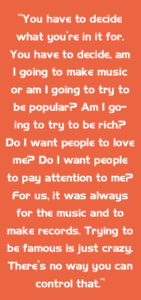
MC: What about VR?
Coyne: I like it; it’s just a different format. [If] there’s a live performance and then you watch it on TV, is it the same thing? All formats have possibilities of being amazing. I just don’t feel you should wake up, grab your guitar and sing the first thing that comes to your head. That doesn’t feel worthy of someone’s time.
Eventually, we probably will play some kind of live shows. I just feel awkward thinking, oh, it should be about us when there are so many people out of work. It’s not about “When am I going to see a concert?” It’s about “How am I going to survive?” I don’t feel it should be about us. It should be about getting this dilemma fixed and then we can go back to being entertained. You go to a concert to be entertained. There can be deeper reasons as well, but we don’t feel good wanting anybody to spend money on what we’re doing right now because nobody has any.
MC: But you’re sort of pioneers in ways of coming up with incentives for people to spend money on your material.
Coyne: [laughs]
MC: I think you were ahead of the curve on that. What does management think when you say, “I’m going to put music in a gummy skull”?
Coyne: I think all creative people are in agreement about those things being fun and fantastic. They are hard to pull off. With the gummy skulls, it was in the middle of a very hot summer. And we had never worried about carrying candy that would melt. Luckily, I’m stubborn and I’m going to keep trying to make it work. We got lucky in that we ran into the inventor of the world’s largest gummy bear, who is a Flaming Lips fan. It always helps when you attract enthusiastic, likeminded experts. He knew what he was doing and knew he could do it. So it wasn’t just the idea. The idea attracted someone who knows how to do it.
MC: Speaking of novelty, you have country artist Kacey Musgraves on this album. How did that connection happen? Are you a fan of country music?
Coyne: I wouldn’t say all country music. There are some classic country artists we love. Kacey, I feel, falls into being one of those classic country artists. I like her. I like the way she sounds. I like her group. I like her vibe. So I never really think of her as country. She just seems like an American singer-songwriter gal.
Three or four years ago, she came through Oklahoma City. I didn’t see her, but some people reported that she seemed to have some Flaming Lips influence. So we became interested. When we found out she had done our song, “Do You Realize??,” for her encore on the Saturday night set at Bonnaroo the previous summer, we just fell out of bed. Then we watched videos that were out there and it’s an amazing rendition.
So I started nosing around and asked if she wanted to collaborate. I think she probably at first was like, ugh, I don’t know. But I was relentless and she said yes, so I’d stop bugging her. But she’s so sweet and wonderful. She’s a great singer. We were very lucky she lent her voice to be part of our album.
MC: You’re always connecting with somebody unexpected or doing something high-concept. Do you think these ideas help or hurt your career?
Coyne: I wouldn’t really know about that. There is a good 60% of any music or art that you’re just doing because you like it. You don’t really care if it’s branded or marketable or if anybody likes it. That guides us, for the most part. Then there are times when you think this is absolutely going to work.
With Kacey Musgraves, I don’t think that is that strange. And none of us felt like that with Miley [Cyrus]. We adore Miley. We’re very glad she wanted to do what, for her, was absolutely insane. We never thought much about––is this going to help us as a marketable idea? The music is all that matters. Everything else is just stuff.
MC: You collaborated again with producer Dave Fridmann on this album. Is there a reason you keep using him?
Coyne: We’ve been making records with Dave Fridmann since 1988, so it really is just the way we make records. Say Kanye West called and said, “Hey, I want to produce your next record.” I’m not sure I would want to. I never think, could there be someone else? Or, should there be someone else? This is just the way we make records. Dave’s very driven and focused and always pushing us. I’m not saying I wouldn’t do something with Kanye but I’m not sure I’d want to do a whole Flaming Lips album with him, you know? But he’s going to be president, so he wouldn’t have time.
MC: Do you seek out sync placements? You’ve had your music in some interesting movie and TV soundtracks.
Coyne: I’m not personally doing it, but through publishing companies, sure. And we’re lucky that a lot of art directors are Flaming Lips fans and are always saying, well, this is interesting. This is different and good for your plot or branding or the vibe you’re trying to create. I don’t think it’s because we’re pursuing it. You’re at the mercy of what’s available and what people want to use your music for. We’ve been lucky that some of the things [our music has been used in] have been cool and unexpected and well done.
MC: Do you come up with the concepts for your videos or do you choose a director you trust?
Coyne: We’ve only done a few videos where other people have directed. Most are directed by me, for good or bad. I use the word directing because that’s what people call it, but it’s mostly that I’m the one who’s getting it all together and making it happen. It’s another version of being creative and getting to do stuff.
That’s one of the great, ever-moving aspects of being in a slightly successful weirdo band––there’s so many great things you get to do. You get to make music with friends, travel, meet cool people, work with other cool artists, make movies, make videos, create products… There are so many things. Once we finish a record, it starts another process of making videos and t-shirts and all that. If you didn’t like it, it would be a complete headache because there are so many things to do and everything is due tomorrow. You try your best to make everything the way you want it and make it on time. But you have to just embrace all the opportunities that come along.
I was born in 1961, so I grew up with The Beatles and Elvis Presley. They made movies and were on TV and made videos. It wasn’t just music. We were very aware of what they wore, the drugs they took and things that happened to them. It wasn’t just that they played guitars and sang. That’s what I like about being in a group; it opens up a whole life that is filled with everything creative. And when it goes well it’s insanely fun. And even when it goes bad it’s still pretty fun.
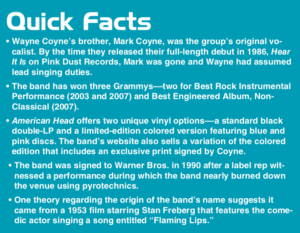
MC: You’ve had a bunch of members leave over the years. That’s a trauma for any band. How do you deal with that?
Coyne: We’ve been a band for almost 40 years. [When] I think of people who’ve been in the band and left, it never seems like many because if someone leaves after five or six years that’s still the span of some bands’ whole career. I don’t think we would’ve wanted to even know we were going to be a band for 40 years. In the beginning, you just think this is something silly we’re doing to last us through the summer. You don’t really think the things you said when you were 22 are still going to be with you when you’re 60. You just think, what the fuck?
I don’t think anybody has ever joined or left The Flaming Lips as a career move. There would be no advantage or disadvantage to being in or out. It’s mostly that people are likeminded friends and it either works for a while or it doesn’t. Of the people that have left, most are still friends. They just didn’t want to do it anymore. Almost every time someone left the group it made us do something cooler. It’s an opportunity to say, good, I was kind of bored with that anyway. Let’s go in this other direction. That happened to us in the mid-‘90s when our guitar player, Ronald Jones, left. We’d positioned him as kind of the star. But internally he was a lot of stress to deal with. So when he left, part of us was relieved. And it opened up a whole other way of doing music. Within a couple years we were able to transform into this completely different group.
MC: Do you have any advice for musicians?
Coyne: We [didn’t know] there was a music industry when we began. We didn’t know record companies signed you. We knew what music was, we knew what groups were and we knew they made records. We got our first lawyer in 1986 when I was working at Long John Silver’s here in Oklahoma City. He called me at my job; it was the only place I had a phone. We still have this lawyer almost 40 years later. And he’s great for us. So I don’t know.
You have to decide what you’re in it for. You have to decide, am I going to make music or am I going to try to be popular? Am I going to try to be rich? Do I want people to love me? Do I want people to pay attention to me? For us, it was always for the music and to make records. Trying to be famous is just crazy. There’s no way you can control that. But you can control the music you make. You have to hope you get lucky and when it happens that you’re able to deal with it. We wouldn’t have known any of that when we started.
But if you want to be famous, don’t do it in the music business. Run for president. That gets a lot of attention.
